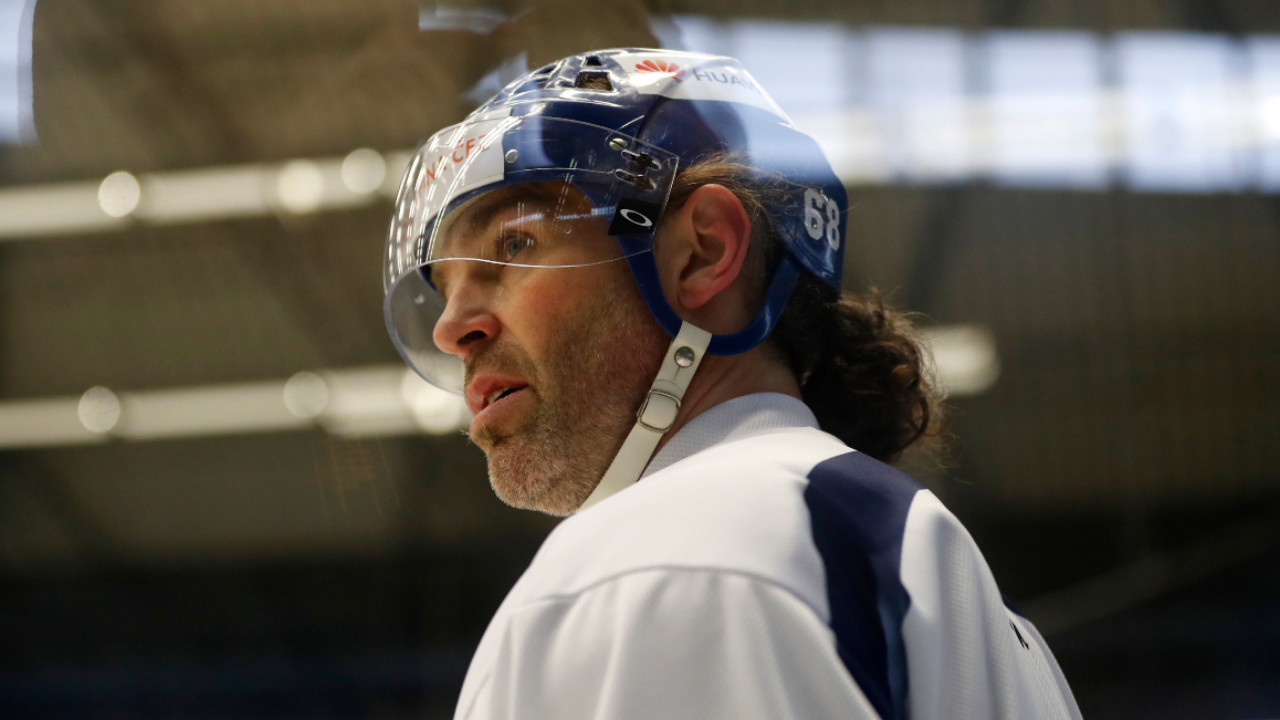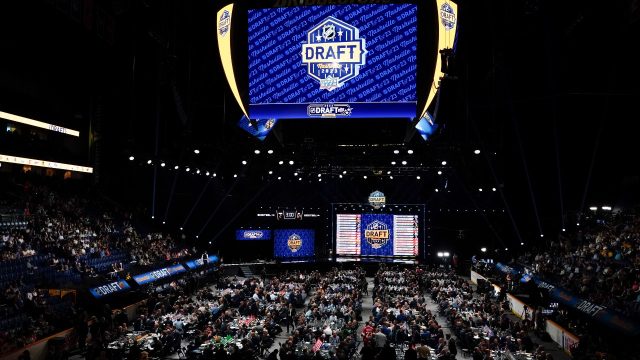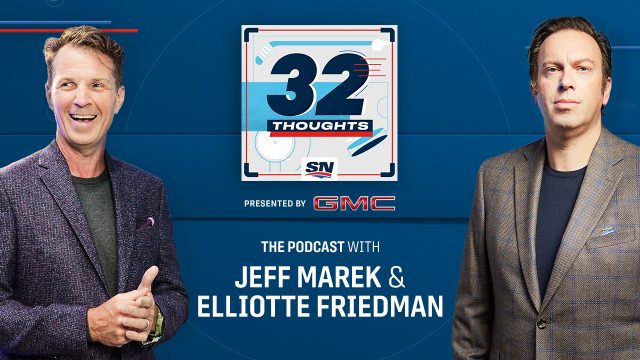
“A BEAST ON THE ICE”
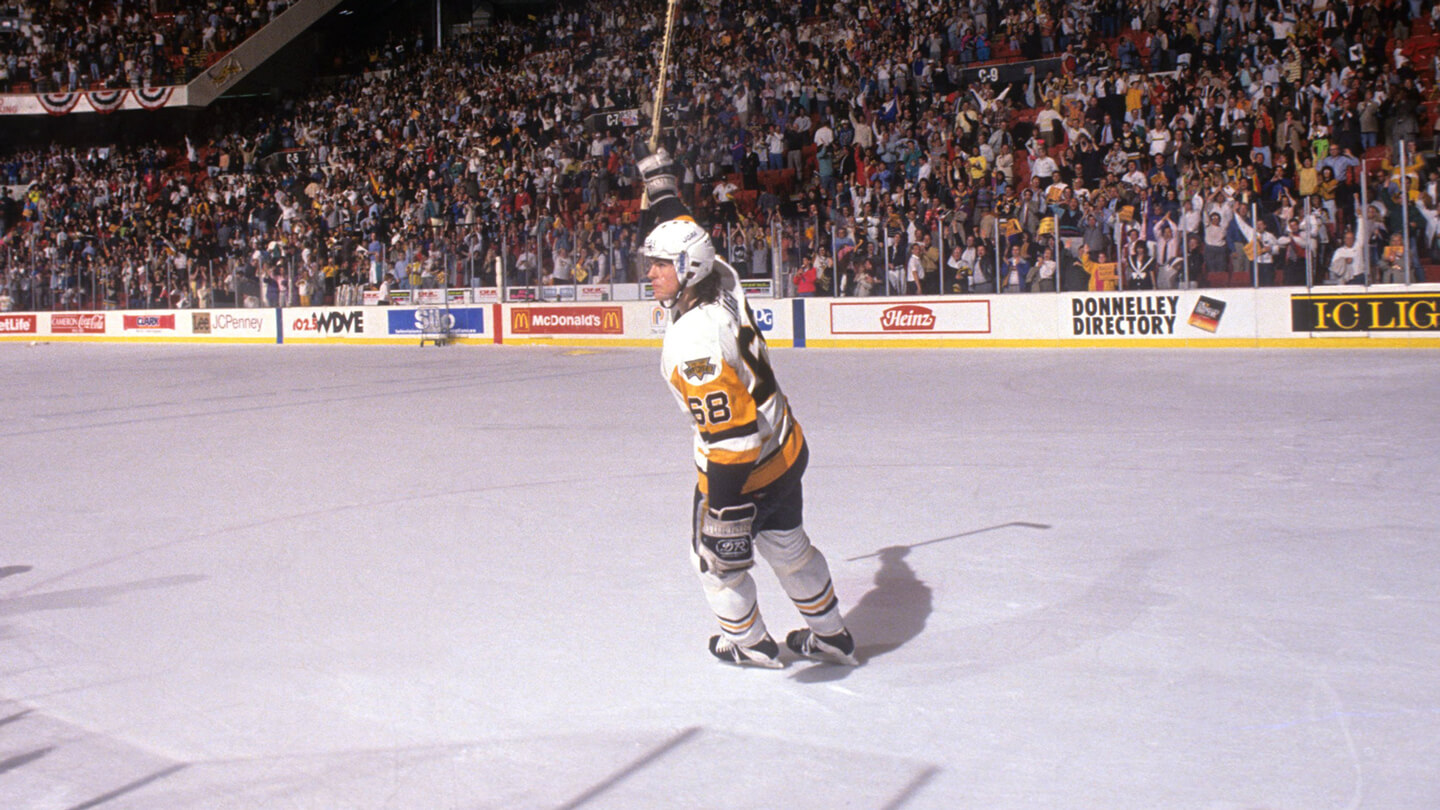
A
t this point, Jaromir Jagr is more myth than man.
So dogged has the Czech talisman been in his decades-long pursuit of on-ice greatness, you can find all of this sport, the whole of its essence, in his story: the farm boy who journeyed to America to find glory alongside his idol, who captivated the sport through sheer brilliance and force of will, whose love for the game was so strong he never left, sticking ‘til his locks greyed, and his accolades turned historic. And then there is everything in between: the mullet, the salute, stories of midnight skates in darkened rinks, a collection of jerseys grown absurd.
There has simply never been another who graced NHL ice the way Jagr did. In 24 seasons, the Kladno product amassed a Hart Trophy, two Stanley Cups, three MVP nods from his peers, five scoring titles, and 1,921 points — second-most in the league’s history. For this indelible impact on the game, his No. 68 will be raised to the rafters Sunday in Pittsburgh, the city finally welcoming him home.
But back before all the trophies and historic numbers, before he became an icon in black and gold, Jagr was just a teenaged dreamer, stepping off a plane in a new country with no idea what to expect. This is the story of the year No. 68 first touched down in Pittsburgh, and found back-to-back glory, as told by the teammates who were there alongside him.
With the fifth-overall pick in the 1990 NHL Draft, the Pittsburgh Penguins selected a baby-faced Jagr from his hometown club, Kladno. Soon after, the 18-year-old was en route to Pittsburgh to meet his new teammates.
MARK RECCHI (’91 Penguins championship team): I was actually at the Draft in Vancouver when he got drafted. I just remember how excited [then-GM] Craig Patrick was about it — he thought he was the best player in the draft, and we got him at No. 5.
JAY CAUFIELD (’92 Penguins championship team): The first time we all met, Craig had a party in downtown Pittsburgh, when they brought Jagr to town. His mom and dad were there, and [Patrick] tried to get people from the Czech community, something to help them be a little more comfortable.
PHIL BOURQUE (’91 & ’92 Penguins championship teams): He didn’t speak hardly any English at all, so it was tough to communicate. There wasn’t a whole lot of that kind of interaction.
CAUFIELD: There was the language barrier, but he came across the same way all the time anyway — he was just happy-go-lucky.
JOE MULLEN (’91 & ’92 Penguins championship teams): We had a pretty veteran team there for him to fit into, with the older guys. You know, he was such a nice kid, smile on his face every day — it wasn’t hard to bring him into the group.
LARRY MURPHY (’91 & ’92 Penguins championship teams): I just remember how young he was. He was 18 years old, and English was a language he was learning. Not only was he adjusting to the National Hockey League, he was adjusting to life in North America.
CAUFIELD: He went back to [Czechia], then he came back earlier and we skated together for the time leading up to training camp. As soon as he got to town, we got on the ice right away, Craig joined us, and that’s how we got accustomed. He was always the same — he worked extremely hard, and it started from the first time I skated with him.
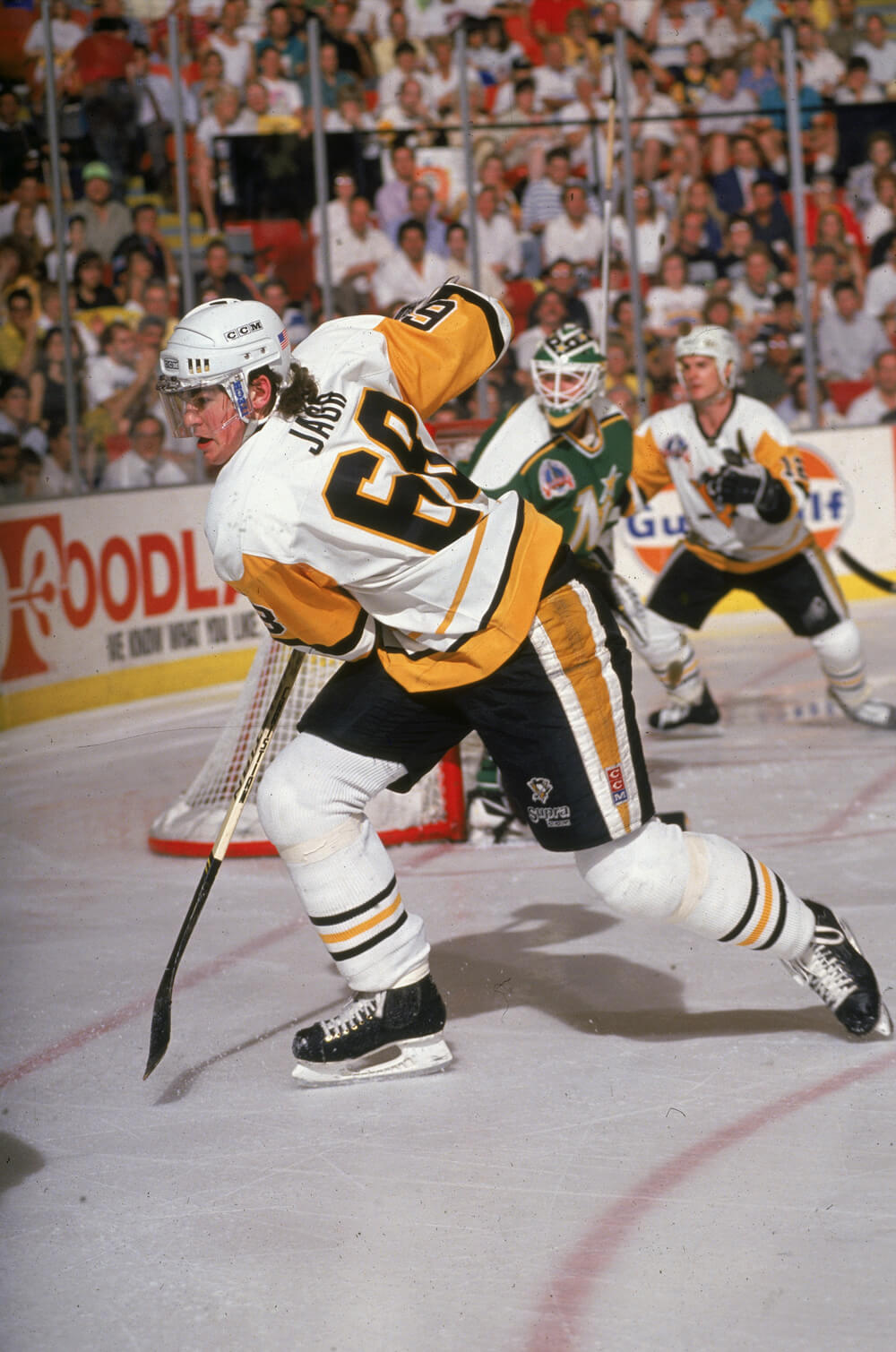
Still adjusting to life in a new country, the rookie was quiet and unassuming off the ice. As soon as he stepped onto the sheet, though, Jagr made his presence, and immense potential, known.
RECCHI: You saw the talent right away. I mean, he wasn’t a big guy yet, he was 18 years old, but you could see his raw skill. You could see how talented he was, and his work ethic jumped out right away. You know, you could tell he was a player that wanted to get better right away, and help.
BOURQUE: I can tell you this, as far as what my eyes told me about his build, and his ability on the ice — they were different. He was overdeveloped in his lower half — his rump, his legs, really all of him. For a kid that was still a teenager, he was very developed in areas that are really important in the game of hockey. And then on the ice, you could just tell this kid was different. This was not just your normal first-round pick — this kid had something special.
CAUFIELD: You knew he had a work ethic already, just from what we were doing. From the get-go, being on the ice with him when he first came over here, if the drill went long, there was no issue. He just went with every drill. The endurance he had, I think that’s a gift — some guys have that. Mario had this endurance level that was probably second to none. He just had that drive, that stride, the leg strength. Jagr was a young kid who was developing that — he had it at an early age, and it only got better. You knew he was going to be something special. He worked at every phase of the game.
MURPHY: I got to Pittsburgh in December and, of course, he had a couple months under his belt by that point. I saw him in the dressing room before I saw him on the ice, and you realized just how young this kid was. But when you got on the ice, you could see the high skill level. He could really, really handle the puck well. Even at that age, it was difficult to take the puck off of him, which became his calling card all his career, the ability to protect that puck. And, of course, his touch around the net. Those things really stood out. He was a guy that I noticed right off the bat — to play against him, it took a full commitment. You just knew, any sort of advantage that he had, he was going to make you pay for it.
BOURQUE: You never really know how far it might go. Back then, you just knew this was something unique, and it could be something special if he figures out how to play in the league.
MURPHY: I mean, right from the first day I saw him play, even as an 18-year-old, he had the capability of making the big play, scoring the big goal. You knew that there was greatness ahead for him. It was still early in that whole process, but he was an impact guy right off the hop, right out of the chute, as an 18-year-old — boy, he could come up with some pretty amazing plays.
MULLEN: He showed right from the start that he could handle the NHL, and be a force out there.
Even in those early days, as a teenager finding his footing in the big leagues, Jagr’s teammates could see glimpses of greatness in the raw talent he was beginning to mould.
RICK TOCCHET (’92 Penguins championship team): For me, it was his corner work. I mean, all-time, he’s probably one of the top three best players there. If you had a one-on-one game in the corner, who would come out with a puck, he’d be in my top all-time three that I’ve ever been involved with — whether watching or playing against or coaching. His one-on-one game in the corner was just outstanding, his puck protection. The way he could just hold onto pucks was what stood out to me. You know, obviously the flare and obviously the shot, the passing — all that stuff, he had. But to me, the one-on-one game was his gift.
MULLEN: The way he protected the puck at that early age in his career, with his body, was unbelievable. I mean, he used to throw guys off his back all the time, trying to check him — he was just so strong.
BOURQUE: He could just hang on and buy himself not half a second, not a second, but seconds. Which is rare. You know, when you’re talking about a six-foot-four, 230-pound defenceman on your back — he had no problem fending that off, to do what he wanted to do next.
CAUFIELD: If you polled players through those years, he was probably the most difficult to take the puck off of.
RECCHI: And he wasn’t a big kid yet. As he got stronger and bigger, it became even harder and harder. You know, he was a beast on the ice.
BOURQUE: He had a great release. Part of it was the type of curve that he used — it was a heavy toe curve, which allowed him to curl and drag the puck very quickly into his body. And just the strength that he had in his hands, his wrists, his forearms, his shoulders, allowed his shot to be lethal. Really quick hands to go along with a quick mind, to think the game on a Mario Lemieux-level, right away. You know, to me, I think you can develop that, but I think most of that is just God-given. Just to be able to pick up what somebody else is doing quicker than most. He had that ability.
MURPHY: On the ice, boy, he was like a fish in the water. It was very natural for him.
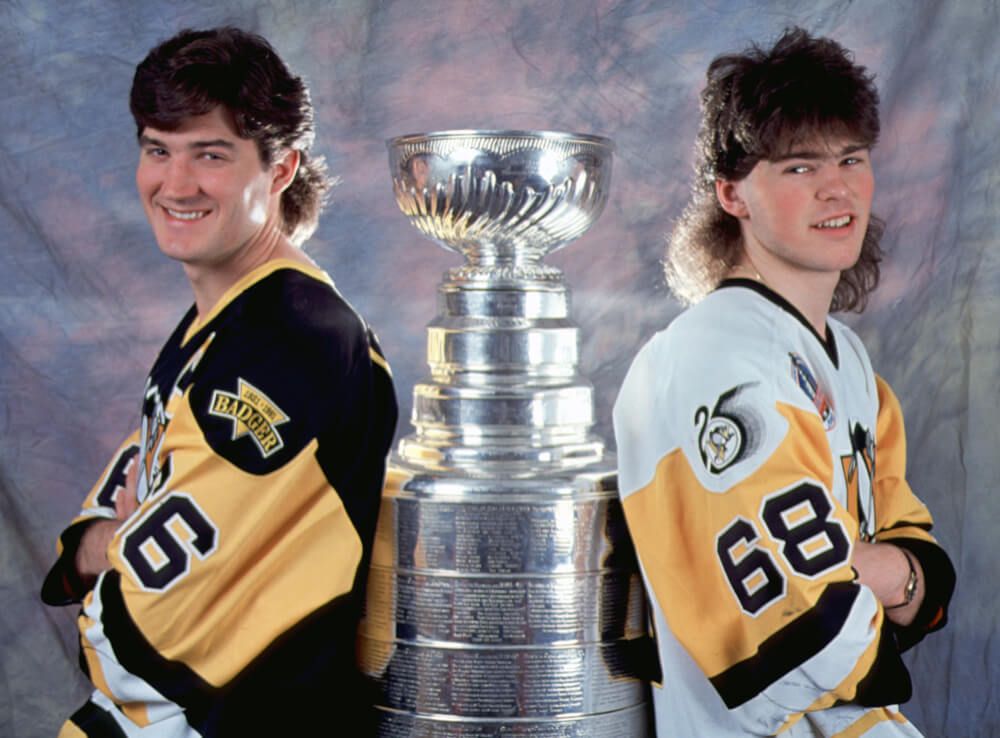
The young phenom’s obsession with the game became more and more apparent as the year wore on. Jagr soaked up all the wisdom he could from his Hall of Fame teammates, honing his game relentlessly.
MULLEN: As the year went along, you could see he had that drive in him, to keep practicing, to get better and better. You could tell right away that he wanted to be one of the great players in the league. Because you couldn’t get him off the ice after practice — he wanted to do extra, and he was out there early. You know, he was a kid that was definitely driven to go to a high level.
BOURQUE: The kid was just a sponge — they had to kick him off the ice. Rick Kehoe was our assistant coach, and they gravitated towards each other. They just had a connection. And Rick Kehoe spent an incredible amount of time working with him on the things he wanted to work on — whether it was a one-timer, whether it was a quick release, whether it was receiving a puck on the backhand and giving it to a forehand, knocking pucks out of mid-air and then shooting them.
CAUFIELD: He continued to work on his release, his shot. Rick Kehoe was a big part of that, helping him every day during practice, before and after practice. He just had that drive to be great, because he was surrounded by greatness. I mean, the players on our team, there were so many Hall of Famers, and he was surrounded by guys that knew how to win, how to be successful. I think he was like a sponge — he just took that in, worked on his own and with the team and with the coaching staff. Any little thing he tried to work to get better at, he did that.
MULLEN: His love for the game you could see too. You could see he loved to play hockey. He was smiling almost all the time. You know, when things don’t go your way, sometimes you don’t smile — but he could keep a smile on, play hockey, have some fun and play his best.
CAUFIELD: I think he was loving life as a professional hockey player, playing in the National Hockey League. He was becoming elite. I mean, he just had that part about him. But he was in a talented environment with Mario doing what he did, and how the team was building around it. I think he was just loving every part of every situation that we were in. And the notoriety that came with it — the more success he got, the bigger he became.
MULLEN: Knowing that Mario was his idol, you knew he wanted to be just as good, if not better than Mario. He was driven to do that.
BOURQUE: Bryan Trottier and him became very, very close. I think Trotts almost took it upon himself to be a bit of a father figure to Jags, and had a way to talk to him. And Jags was also a student of the game — he knew Bryan’s history with the New York Islanders, so there was that instant respect. He just had so many great players that realized how talented he was, and once we saw him starting to get some traction in the league, a lot of us wanted to help him.
CAUFIELD: Nobody tried to put the rookie in his place. He was a dynamic player early in his career, and our team was the perfect one for him, because everybody made it comfortable for him. So from there, I think his growth started. It was a team that, if you needed help, people were trying to do that.
MURPHY: He was still making the adjustments to the grind of the league, to life in North America. He was a young kid, English was his second language. Having said all that, when the puck was dropped for a game, he was right in there, in the thick of things.
While he grew doggedly determined in his pursuits on the ice, Jagr took a different approach away from the arena, experiencing all he could of life as a teenaged hero in America.
BOURQUE: I think the best way to describe it is just a natural, free spirit, who wanted to experience everything that a country like the United States could offer to him. Whether it was getting blue jeans, whether it was driving a Camaro, eating the food, going out — all that was so new to him that he wanted to experience it all, in one day, almost. You know, he was that excited to be in Pittsburgh, in America.
MULLEN: He was a happy-go-lucky guy, living with his mom in Pittsburgh, loved to play hockey. That was his life. I knew he liked to drive cars pretty fast, as some of his tickets would tell you. Other than that, we didn’t see him a whole lot off the ice. It was more of a veteran team, everybody was with their families. So, he might’ve been hanging out in different places than we were.
CAUFIELD: I think Craig really tried to work to make sure he got people around Jagr early on, that he saw different types of professionals, and however they needed to prepare. I roomed with Jagr for a little bit, because one of the things that Craig also did was he had a number of players room with him.
MURPHY: I know he had moments when things were difficult for him. [Penguins head coach] Bob Johnson was probably the best coach for somebody in that situation — Bob was such a compassionate man and really understood how to help Jaromir get acclimated to life over here in North America, and to hockey in the National Hockey League.
RECCHI: I think when we brought in Jiri Hrdina, who obviously was Czech and was very well-proven — a Stanley Cup champion from his home country — it kind of got to another level after that. Because I think he was a little bit homesick there for a while.
BOURQUE: Think about the players, the number of Hall of Famers on those two teams that he was around. The first year, Ronnie Francis comes in. You’ve already got Paul Coffey there. You’ve got Mark Recchi there. You’ve got Bryan Trottier there. Joey Mullin’s there. Jiri Hrdina came in, and we knew he had won a Cup in Calgary. He comes in, sits next to Jagr in the locker room. Hrdina, he could play — he wasn’t just brought in to be a babysitter — but he also allowed Jags to understand the language, understand what was going on.
Because we had a bunch of alpha males in the room — where I’m sure as a teenager, you’re like, ‘Whoa, what is going on here? Not only do I not understand what they’re saying, but they’re all talking to each other like they hate each other.’ That wasn’t the case at all, we just held each other accountable. We didn’t need a coach to come in and tell us what we were doing wrong, or get us motivated to play — we did that to each other. But Hrdina understood. So he helped translate not only the English language, but the language of the Pittsburgh Penguins locker room, which could really be over-the-top at times.
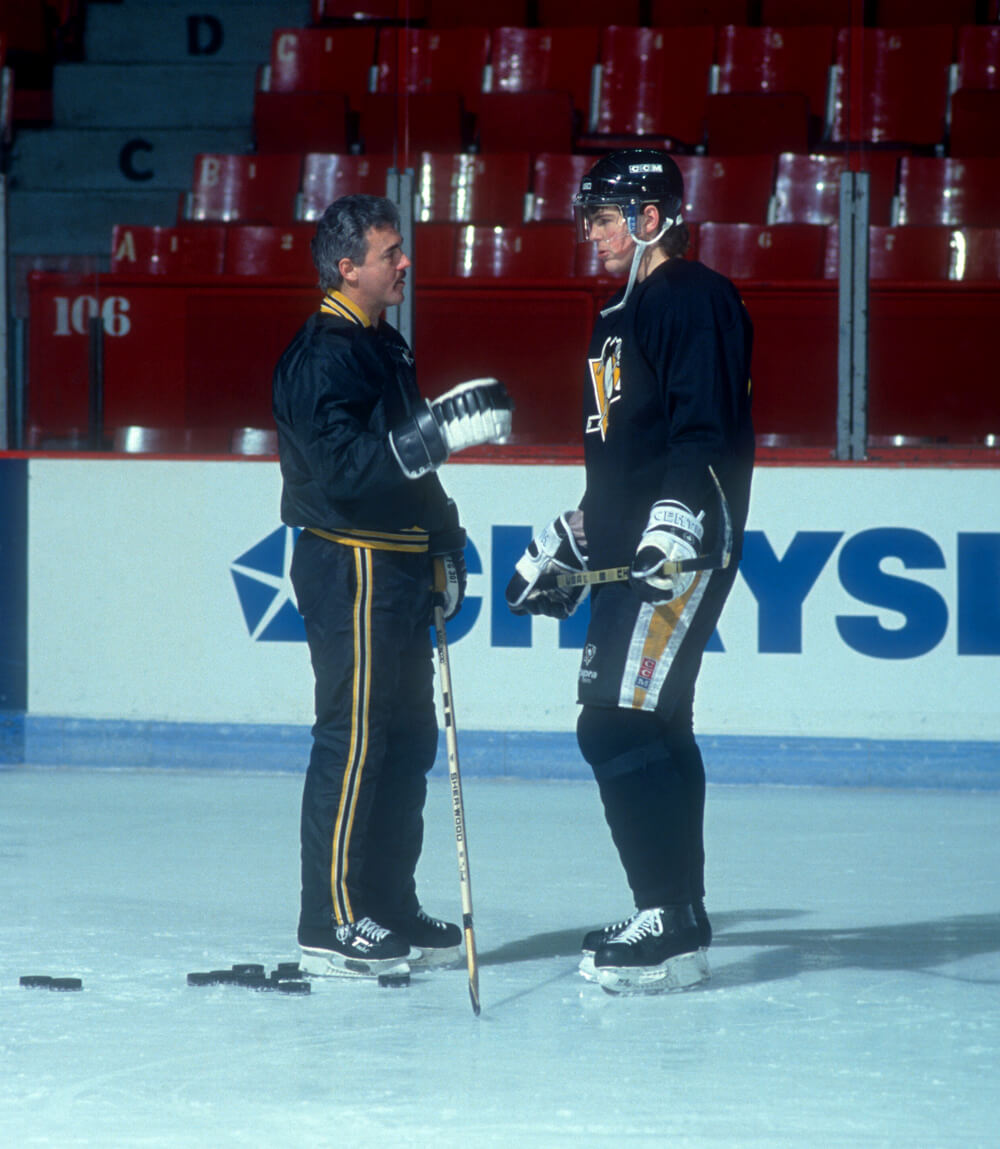
After a regular season that turned heads around the league, the 1991 post-season arrived. Jagr marched into those playoffs seeking glory, flanked by Hall of Famers, and success came swiftly for the star rookie.
RECCHI: When we came to the playoffs, he was ready to roll. Sometimes young guys, they get to that point, 18 years old, and they’re not ready. You know, it’s a long year, especially for a young man coming from Europe. They didn’t play the amount of games that the NHL schedule played. How he handled it was terrific. He really, actually, just kept getting better and better.
MURPHY: With the type of lineup that we had in Pittsburgh, he easily could’ve been relegated to, you know, eight minutes a game, 10 minutes a game. But it speaks to the type of player he was that that wasn’t the case. Of course he wasn’t playing as much as Mario Lemieux was playing, but I mean he was on the power play, he was getting quality ice time right off the hop. For an 18-year-old, that’s exactly what you want, you know? He earned his way right into significant ice time. You talk to anybody in the Penguins organization about Jags, they couldn’t believe it, how fast he caught on. He was off and running. He was an impact guy. And it was clear he was on the way.
RECCHI: In the playoffs, obviously he scored some real important goals for us. He was playing with Bryan Trottier most of the time, and Trotts was unbelievable towards him. They had a great relationship, and I think that really helped him as well. We had veterans like him and Joey Mullen in the dressing room.
MULLEN: It was just the way he handled himself. He was playing on the third line with Bryan Trottier and Troy Loney, with veteran guys who could help him out, get him the puck. He was just a strong player all the way through. You know, that whole year, he just seemed to take another step every game, to get better. And once the playoffs came, he was an outstanding player for us. I mean, he was a force out there — what else can you say about him?
RECCHI: It’s a different game. He embraced it, he loved it, and he actually thrived.
CAUFIELD: If you look at some of the playoff goals, and what he did to help our team win the Stanley Cup, I think he just grew. Being around Mario, watching what Mario did, how he played the game, how he battled through injuries, but what he still did when it was time to play the game. He always found a way to be at an elite level. And I think Jagr probably took all that in.
MULLEN: Finally hitting that ultimate goal, it’s the best feeling ever. So, you just enjoy the moments that you have with your teammates, and Jaromir was right in the mix with everybody.
CAUFIELD: The fanbase fell in love with him. A young guy, who was appealing to everybody. The team got themselves on such a great run with Bob Johnson. He was positive every day he came in the locker room — I think one year of being with Bob Johnson also was a benefit for Jagr. He helped make it comfortable for somebody who was probably going through a lot. I think Bob Johnson was integral as well, just his personality and how it rubbed off on everybody, for our team to win the first Stanley Cup in Penguins history.
While he earned a ring as a rookie, it was when he returned to the playoff stage as a sophomore in ’92, that Jagr truly turned his obsession on the league, and announced his presence to the hockey world.
MURPHY: The second year in, he was much more comfortable — more comfortable living in North America, he was acclimated to life in this game. He continued to evolve, he started taking on more ice time. It was just a progression. He came in, he was highly skilled, and he had to learn the defensive side of the puck — that was something that all guys have to learn. So he went through that process, and he became more well-rounded as time went on. And he just continued to make the big play. That’s been his calling card throughout his whole career, the ability to step up when needed and make high-impact plays.
RECCHI: You saw it in the gym — he was in there almost every day. He really wanted to get his legs stronger. He was really passionate about working on his legs — it was a huge focus for him, we saw it all year. And you could just see him getting better and better, and by the time next training camp came around, he was just a lot stronger, because he put a full commitment into it.
MULLEN: He just kept getting stronger and bigger and better. You know, he became that player he wanted to be — that superstar-type player. You move up from the third line to the second line to the first line, and then, you know, you’re one of the top guys in the league. He just matured early — he had that strength and skill, and he just took it to the max.
TOCCHET: When I got traded there, I knew I had a chance to win the Cup. And then I met Jags — I knew him from afar, from playing against him. The third day there, I knew this guy was going to be special.
BOURQUE: I really felt like it was the second Cup run that he went to another atmosphere, that I think he didn’t leave for a long time. You know, we lost Badger Bob in November of ‘91, so Scotty Bowman was our head coach. Mario gets slashed in the second round by Adam Graves, breaks his hand.
TOCCHET: Mario got hurt in the Rangers series, and Jagr’s game elevated.
BOURQUE: You’re talking over 30 years ago, but I remember like it was yesterday — he took over that series. And he didn’t stop there. Next was the Boston Bruins, and then shortly after, the Chicago Blackhawks. And he just dominated, you know? He took over.
TOCCHET: When you’re in a Stanley Cup Final, the spotlight’s on you more, it’s intensified. And I think those series — the Rangers, and then the Chicago Blackhawks series where we won the Cup — I think everybody said, ‘This guy’s legit. This guy’s a player. He’s going to carry a torch as one of the stars in the league.’
BOURQUE: Even when Mario came back, he never took his foot off the gas pedal. I felt like, years after that, there was a confidence and belief and knowledge of what it took to be one of the top five players in the league, and he stayed there for a very long time.
TOCCHET: I don’t even know if there was pressure — he just played. When you’re a veteran player and you have a chance to win it, you see a young guy like that, every day he comes to the rink not even knowing the magnitude, the pressure, just playing the game. Like, he just wanted to have fun. He wasn’t concerned about money, he wasn’t concerned about anything. He just came in as a young kid, he brought a lot of energy to the older guys, and to the city. That’s what I most remember about Jags. He just played.
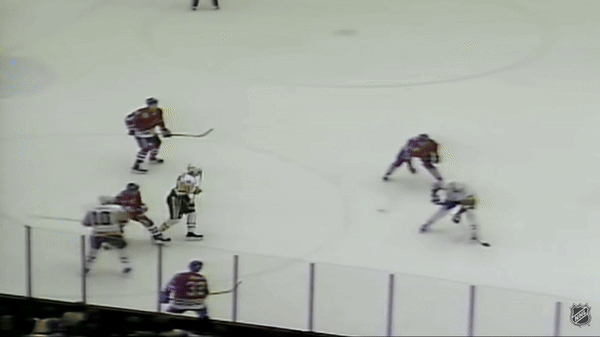
Ask his teammates if there’s a particular play that comes to mind when they hear the name ‘Jagr,’ and one goal stands out among the rest as perhaps the most iconic of No. 68’s career. Anyone with even passing knowledge of the ‘90s Penguins, or Jagr’s run in black and gold, or marquee NHL moments, will know the one.
Game 1 of the ’92 Cup Final, Jagr dancing around opposing defenders late in the third to pull his team level, completing a three-goal comeback. Pittsburgh won the game 5-4. They won the series 4-0.
TOCCHET: It was a huge time of the game. He went around three guys — Steve Smith, then Brent Sutter — and he scored a goal on his backhand. To me, that was like, ‘Wow.’ There was a lot of pressure in that game, because the Hawks were playing a real tight game. And you never know — you lose the game, you give them life, who knows?
MULLEN: Going through two or three guys, backhanding that goal in — it was probably one of the highlights of his career. And definitely a highlight for us in that playoff.
MURPHY: He had the puck for like half an hour before he scored.
TOCCHET: When he scored that goal, I looked at Kevin Stevens and said, ‘We’re not going to lose this series.’ I swear, I said that to him. We looked at each other like, ‘No chance.’ After Jagr scored that goal, I think that deflated the Hawks. Because you got this kid out there, doing what he was doing. And that goal to me was just a Jagr goal — under pressure, taking the puck off a really good defenceman, beating a great defensive forward in Brent Sutter, going and scoring on Eddie Belfour. That showed me, ‘Oh my God, we’re going to win the series.’
BOURQUE: It was a combination of not only great skill and talent to create that goal, but also the understanding of, ‘My team needs me, right now, to do something special.’ And he would rise to that occasion, knowing, ‘It’s my time to shine.’
CAUFIELD: That goal just gave me an idea of what everybody could expect to hopefully see for years. And that’s exactly what happened.
MARIO LEMIEUX (’91 & ’92 Penguins championship teams) at his post-game press conference: That was probably the greatest goal I’ve ever seen. I’ve scored a lot of big goals, but you know, 1-0 down, picked up the puck, beat three, four guys. He’s got such great balance, he can beat a guy one-on-one at will, and he’s very strong in his upper body. That was a great goal.
TOCCHET: [After winning that second Cup] I think his personality came out. He was a shy kid, and I think he started to realize, you know, he wasn’t the homesick kid anymore. Pittsburgh was his home now. He was on stage there, and I just remember him smiling.
You know, he had a tough time talking in front of the players sometimes, 20 guys in the room. And then when he was on stage, you know, 50,000 people at Three Rivers Stadium, he got the mic and I think that’s when he just kind of came out of his shell. He was beaming, he said a couple funny things to the crowd — his personality took over.
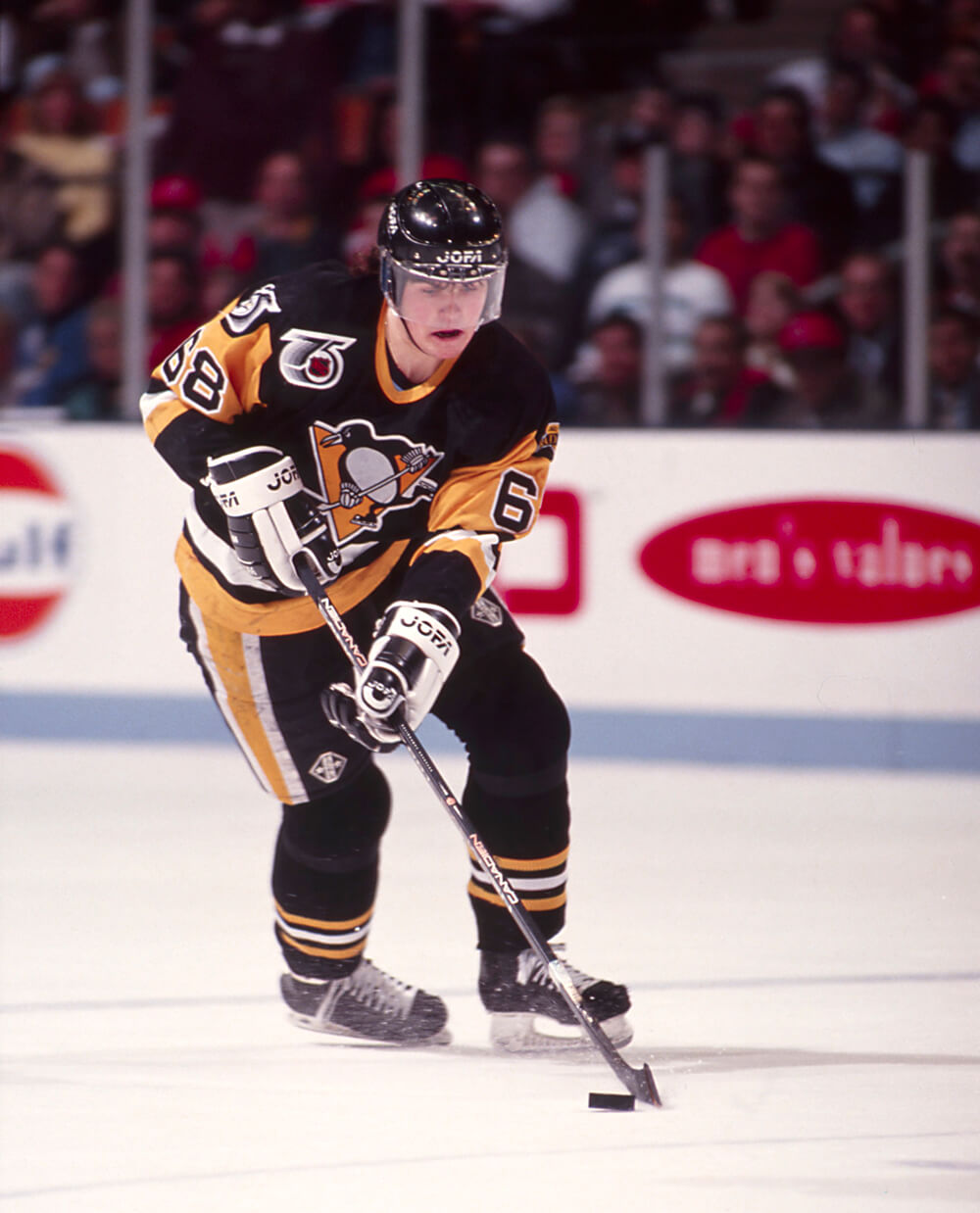
No one on those back-to-back championship squads could have predicted the winding path No. 68’s career would take from that moment: the falling out with Pittsburgh, the departure, the spin through eight other NHL franchises, the timeless longevity. But there was one thing they did see coming: Jagr’s continued ascent to become one of the sport’s all-time greats.
BOURQUE: I knew how great he was, and I knew if he had good players around him, he could do great things. What I was the most surprised at was how long he did it for, and at how high a level. His last year with the Florida Panthers, he had 27 goals. You know, he was still putting up great numbers in his 40s, which is incredible.
MULLEN: He took such good care of himself physically that it doesn’t surprise me he’s done what he’s done. Especially playing into his late 40s, his 50s. It showed that he stays in fantastic shape and he’s willing to still go out and push himself to be a better player — that that was his character all along.
CAUFIELD: You can’t be anything but impressed. Every player who’s played the game realizes how hard it would be to continue to play the game that many years, and stay at a high level, where you play the game the way you expect yourself to be playing the game.
RECCHI: I mean, it’s incredible that he’s still going. I still can’t believe it. He still looks great, he’s still fit as ever. I skate now and it’s like, ‘Oh, man.’ I can’t even believe it. You know, for him to keep doing what he’s doing is remarkable, really.
MURPHY: It was a case of playing at a high level for a long period of time, and the numbers just add up. I mean, those type of guys — you look at Lemieux, you look at Gretzky, you look at Jags, or Ovechkin — these are guys that play at a high level, year after year. And all of a sudden they just keep moving up the ranks. They’re high-impact guys.
BOURQUE: And then hearing the stories about him — you know, each team he went to, he made sure he got a key to the rink. To get to the NHL, you have to be incredibly dedicated, you have to make unbelievable sacrifices. He was at a whole other level that way, as far as getting the key to the rink, so if there were times he was sitting at home at 11 o’clock at night, he could just decide, ‘I’m going to go to the rink. I’m going to skate. I’m going to work on my game, or maybe I’ll just get a workout in, in the gym.’ I mean, that’s unheard of. But that’s who he was. And I think to this day, that’s still who he is.
TOCCHET: I wasn’t shocked. Everyone’s like, ‘Oh man, this guy’s crazy — he comes to the rink at 10 o’clock to skate at night, on an off-day.’ I said, ‘Well, that’s not surprising. He was obsessed when I was there, when he was 19, 20 years old.’ You know, all the stories from later in his career, of him having weight belts on and shooting pucks, doing crazy different workouts, everybody was shocked, couldn’t believe it, but I wasn’t. I mean, I knew — that’s Jags.
MURPHY: There’s a limited number of guys who played this game, and Jags is one of the all-time greats. And it’s just what I saw right from the start. Seeing him in Pittsburgh, I wasn’t surprised where his career took him.
TOCCHET: There was no agenda, he just wanted to play. ‘Hey, let’s play hockey.’ That was his attitude. And, ‘I want to get better at it, so what do I got to do?’ He stayed on the ice after practice for an hour, off-days he’s on the ice. He had an obsession for it. That’s why he’s a Hall of Famer.
BOURQUE: I think he just had a healthy fear of never being at the level of his expectations. He’s just always had a burning desire to be the best.
Now, at long last, Jagr returns to Pittsburgh, where much-deserved praise will be showered down upon him as his No. 68 is raised to the rafters, enshrined in Penguins history forever.
CAUFIELD: It’s going to be a great thing — it’s overdue obviously, but everybody’s thrilled that this is happening. It doesn’t matter that it’s maybe later than when everybody thought it could have happened. It’s happening, and the people here are thrilled. It’s a player that’s truly meant so much.
MURPHY: You knew it was just a matter of time before this day came, just because of what he did for the team, for the city. So, it’s well-deserved. It’s going to be great for the fans, a chance to thank him again. And he’s going to be enshrined, his jersey hanging in the rafters.
RECCHI: I know the Pittsburgh fans are going to be so excited about the evening, having him back. It’s going to be a great night for Pittsburgh.
MULLEN: He built his own legacy in the city of Pittsburgh, and will always be remembered for what he’s done for the Penguins. And it’s just rightfully so that his jersey should be put up there.
CAUFIELD: There’s the Cups that have been won here, but it’s players like him that people will never forget. He grew up here, like Mario — growing up here, 18 years old, learning a language, playing a sport, and delivering what was expected of him as a top pick for the Penguins. There’s a lot that goes with that, and he delivered. I think the people are going to make sure that he knows that. It’s been an unbelievable line of talent and Hall of Famers that have come through here, but Jagr’s going to be one that the people won’t forget. And they don’t want to let him forget it.
TOCCHET: The city’s won a lot there, with the Steelers, the Penguins, the Pirates back in the day. It’s won a lot. And he’s a winner. He’s an icon in that city, because he won there. You know, they call it City of Champions, and he’s a big piece of that.
Himself, Mario Lemieux, the championship aura around the city — he’s one of those guys, you know? He’s one of those guys.
B. Bennett/Getty Images; Bruce Bennett Studios via Getty Images Studios/Getty Images (3); Steve Crandall/Getty Images.


